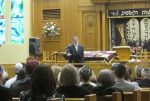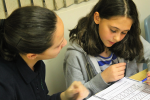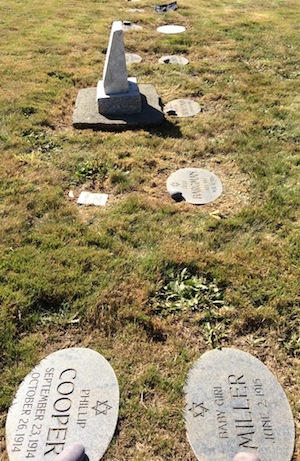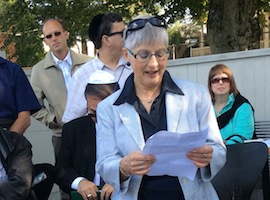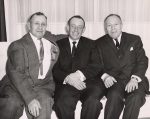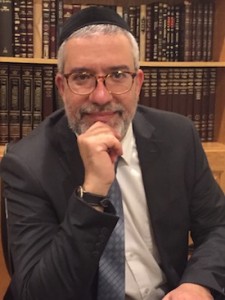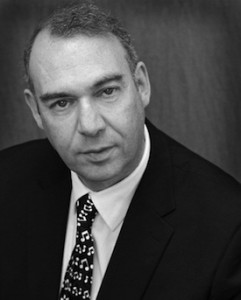Left to right: Stephen J. Adler, Dr. Asher Susser, and Rabbi Shmulik Yeshayahu. (photo © 2017 Alan Katowitz)
In a wide-ranging lecture addressing Israel’s place in a rapidly changing Middle East, Prof. Asher Susser claimed that, without a continued focus on cutting-edge technology and modernization, Israel will not survive in the long run.
Susser, who is a professor emeritus at Tel Aviv University, spoke at the Ohel Ya’akov Community Kollel in Vancouver on Aug. 9. The event was presented by the Kollel, Canadian Friends of Tel Aviv University, Congregation Schara Tzedeck and Vancouver Hebrew Academy.
The professor believes that the key to Israel’s survival is its universities, which he described as the “powerhouses of Israel’s future.”
“Without that basic education, we will not have the wherewithal to withstand the absurdity of the neighbourhood,” he said.
In opening the evening, Kollel director Rabbi Shmulik Yeshayahu noted the “tough neighbourhood” in which Israel lived.
Stephen J. Adler, executive director of the Canadian Friends of Tel Aviv University’s Ontario and Western Canadian division, said that TAU is not only the largest educational institution in Israel, with more than 33,000 students, but that it also houses the largest research centre in the country. He highlighted the university’s affiliations with the Kellogg School of Management at Northwestern University in Evanston, Ill., and also with the Sackler School of Medicine in New York. Adler said TAU alumni have created, among other things, technological innovations like the Iron Dome and the navigation app Waze. Adler invited members of the Vancouver Jewish community to come visit the TAU campus, then introduced Susser, “one of our treasures.”
Susser has taught at TAU for more than 35 years and was director of the Moshe Dayan Centre for Middle Eastern and African Studies for 12 years. In addition to various visiting professorships in the United States over the years, he teaches an online course on the Middle East that has been taken by more than 85,000 students in more than 160 countries, including attendees of the Vancouver event. He is the author of several books, including Israel, Jordan and Palestine: The Two-State Imperative, On Both Banks of the Jordan: A Political Biography of Wasfi al-Tall and The Rise of Hamas in Palestine and the Crisis of Secularism in the Arab World.
Susser discussed the root causes of some of Israel’s past successes – including its ability to modernize and the Arabs’ failure to do so – and remaining challenges. One of those challenges, he noted, is the conflicting narrative regarding the establishment of the state of Israel.
“These narratives are not just slightly different between Israel and the Palestinians, but they are completely contradictory and have virtually nothing in common,” he said. “I would say that this is one of the major reasons why Israel and the Palestinians have such great difficulty coming to terms with each other and the difficulties remain.
“Our narrative,” he continued, “is a heroic story of the self-defence of the Jewish people,” which represents “literally rising from the ashes of Auschwitz to sovereignty and independence from 1945 to 1948, in three very short years.” This was viewed, he said, as “a miraculous redemption and justice for the Jewish people” but is viewed by Palestinians as “the epitome of injustice.”
Susser also noted that the establishment of Israel, wherein “the few against the many” prevailed, is, ultimately, “a monument to Arab failure.” He said, “For the Arabs, when they look at us every day for the last 70 years, it is to look at the monument [of] their failure to modernize successfully.”
He pointed to the Six Day War as a turning point that “proved that Arabism is an empty vessel.” And he listed three reasons why Arab states have failed to advance: a lack of political freedom, a lack of first world education systems and a lack of economic equality and inclusion of women in the workforce.
These weaknesses in Arab civil society, he said, have led to “a human disaster” that has “prevented Arab countries from advancing,” and is worsened by the sectarian divisions that exist in Arab countries. The one exception, he said, is Jordan, which is a stable state in large part due to the fact that its Jordanian and Palestinian citizens are Sunni Muslims.
“Israel’s major challenges now come not from the strength of the Arab states but the weakness of the Arab states,” said Susser. Unlike the period between 1948 and 1967, when Israel was threatened by Arab states like Egypt, Israel is now threatened by non-Arab states like Iran and non-state actors like Hezbollah, Hamas and ISIS. The problem, according to Susser, is that, “You can’t destroy Hamas or Hezbollah in six days.”
“Fighting the non-state actors is a much more difficult prospect,” he said. “These non-state actors are less of a threat to Israel but ending the conflict with them is a lot more difficult.”
The threat from Iran – which he considers to be one of the three principal non-Arab Middle Eastern powers (along with Turkey and Israel) – is “not necessarily that the Iranians will drop a bomb on Israel,” he said. The main problem is “the constraints that a nuclear Iran will pose to Israeli conventional use of military force.”
“If Israel is attacked by Hamas from Gaza or by Hezbollah from Lebanon, or by both of them together, and Israel wishes to retaliate by conventional means against these two Iranian proxies with a nuclear umbrella provided by Iran, will Israel have the freedom of operation to do it?” he asked.
One other challenge Israel faces, said Susser, is demography. He noted there are six million Israeli Jews and an equivalent number of Arabs residing in the area between the Mediterranean and the Jordan River, including the West Bank and the Palestinian citizens of Israel. “Can Israel remain a Jewish democracy with these demographic realities?” he wondered.
Susser concluded on a somewhat optimistic note. The conflict between the Shiites and Sunnis, he said, has allowed Israel to forge alliances with Sunni Arab nations like Egypt, Jordan, Saudi Arabia and other Gulf states, all of which, he said, “have common cause with Israel to block Iranian regional hegemonic design.” In addition, he noted, “We have cooperation with Jordan against ISIS and its allies, so the idea that Israel is against everyone in the Middle East is not the reality.”
David J. Litvak is a prairie refugee from the North End of Winnipeg who is a freelance writer, former Voice of Peace and Co-op Radio broadcaster and an “accidental publicist.” His articles have been published in the Forward, Globe and Mail and Seattle Post-Intelligencer. His website is cascadiapublicity.com.


